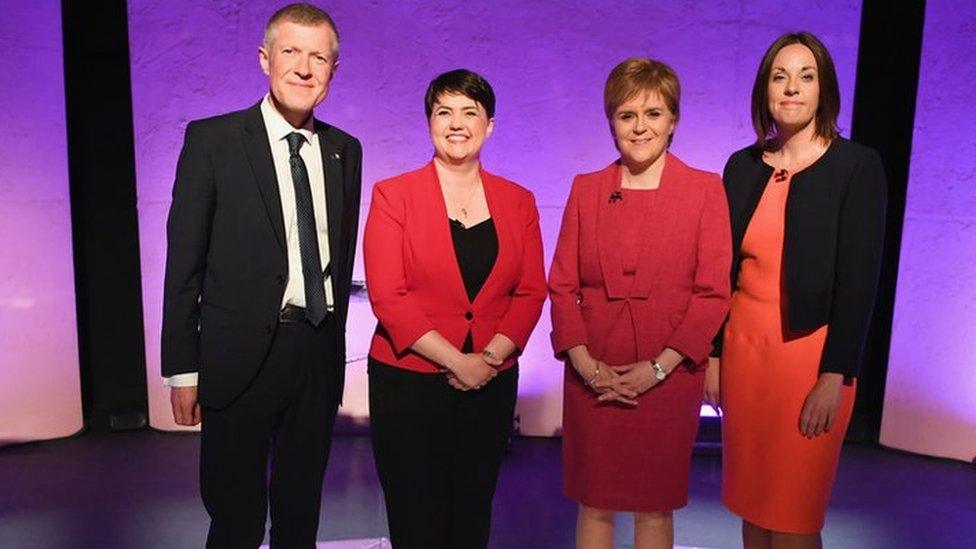Election 2017: Five unanswered questions in the Sturgeon-Dugdale row
- Published
With one day to go, there has been a sudden flurry of excitement in the general election campaign in Scotland thanks to Nicola Sturgeon's claims about a private chat she had with Kezia Dugdale.
For six weeks, it felt like we hadn't really heard anything new from Scotland's political leaders. Seven elections in just over three years will do that - policy platforms and attack lines get very familiar.
It had been a fairly tepid election, in truth. But Nicola Sturgeon changed all that during the STV debate.
Now maybe a she-said-she-said rammy isn't the most mature look for a nation's political discourse, but at least it was something new.
There remain quite a few questions, though...

1. What was said?
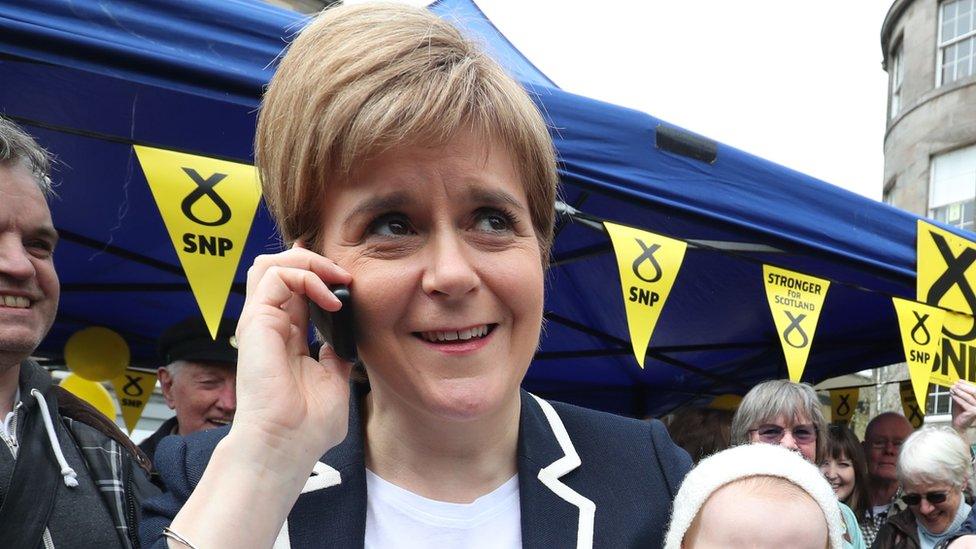
Nicola Sturgeon presumably taking a rather different phone call
During a spiky exchange with Ms Dugdale, the first minister referred to a conversation after the EU referendum saying: "You told me then that the change occasioned by Brexit meant Labour should stop opposing a referendum."
Ms Dugdale looked stunned. Scottish Conservative leader Ruth Davidson looked delighted, and was quick to bring the issue up again.
Ms Surgeon repeated: "She said she thought Brexit changed everything and the Labour Party could no longer go on opposing a second independence referendum."
Ms Dugdale offered a denial of sorts on air - saying she opposed independence, but notably not referring to indyref2, the specific subject of the claim.
During the debate, she said: "The idea that I would do anything other than protect the United Kingdom and fight to remain in the UK is an absolute nonsense."
She hit out far more strongly on social media afterwards, joining her Scottish Labour colleagues in calling Ms Sturgeon's claim a "categoric lie".

2. Can it be proved?
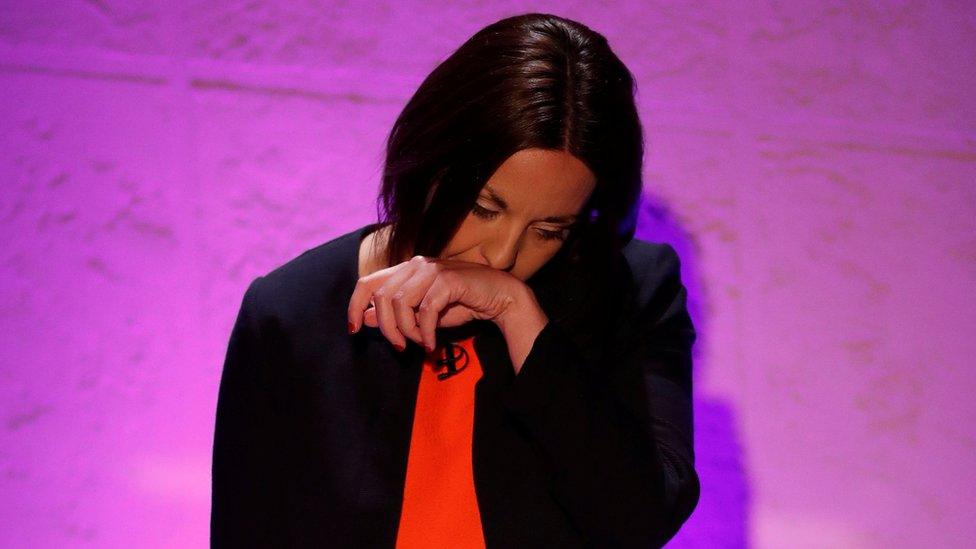
Both sides confirm that a conversation took place - they disagree about the content.
It appears there is no formal record of the conversation. Neither side admit to taking any notes. Where does that leave us?
The problem for Labour is that the claim has an air of believability. After all, Ms Dugdale did say publicly, in a notorious interview with the Fabian Society, that it was "not inconceivable" that she might back independence to keep Scotland in the EU.
She quickly clarified her position, and has worked hard on her pro-union credentials since - but the Conservatives have made endless hay with the idea that Ms Dugdale is weak on independence.
But this is something different from those 2016 interviews. If it was the same thing, why would Nicola Sturgeon have broken a confidence to talk about it?
The SNP were quick to point to a Times interview, external where Ms Dugdale had previously referred to this private conversation - although they say the Labour leader's account was a selective one.

3. So why now?
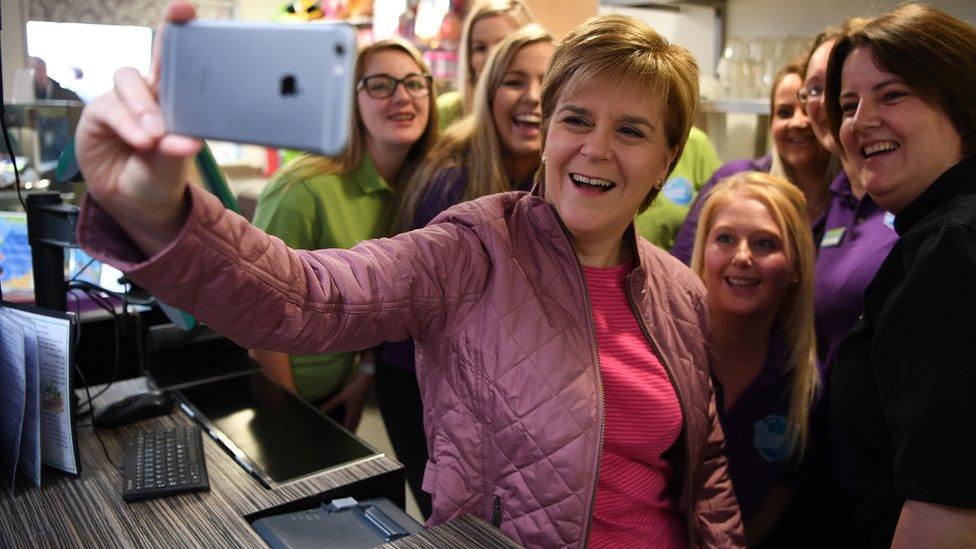
The SNP campaign has largely been about defending seats rather than going on the attack
The SNP campaign up until now had focused very much on the Conservatives. Labour were almost an afterthought; Ms Sturgeon directed most of her fire at Theresa May and the Conservatives.
But recent polls have suggested the Jeremy Corbyn-led Labour surge was starting to have an impact north of the border. Were the SNP worried about losing votes to Labour in its old heartlands?
In the longer term, there's also an argument that the Conservatives are a more natural foil for the SNP. The SNP would far rather have a two-horse race against the Tories than against Labour - a poll in the Times this morning underlines that, with suggestions that Theresa May returning to Downing Street would boost support for independence, external.
Given they hold 56 seats, the SNP have been largely on the defensive in this election campaign. Naturally so, given their main role is to defend, rather than take, seats.
All of the other parties are trying to win seats in Scotland exclusively from the SNP; they are the target of choice.
This attack was a chance for Nicola Sturgeon to actually grab the reins and shape the narrative, for perhaps the first time in the campaign.
It's fascinating that she chose to do so with an attack on Labour, rather than the Conservatives. And it's fascinating she felt she had to use the content of a private conversation to do so - a move which could easily look bad in the eyes of some voters.

4. What about the Tories?
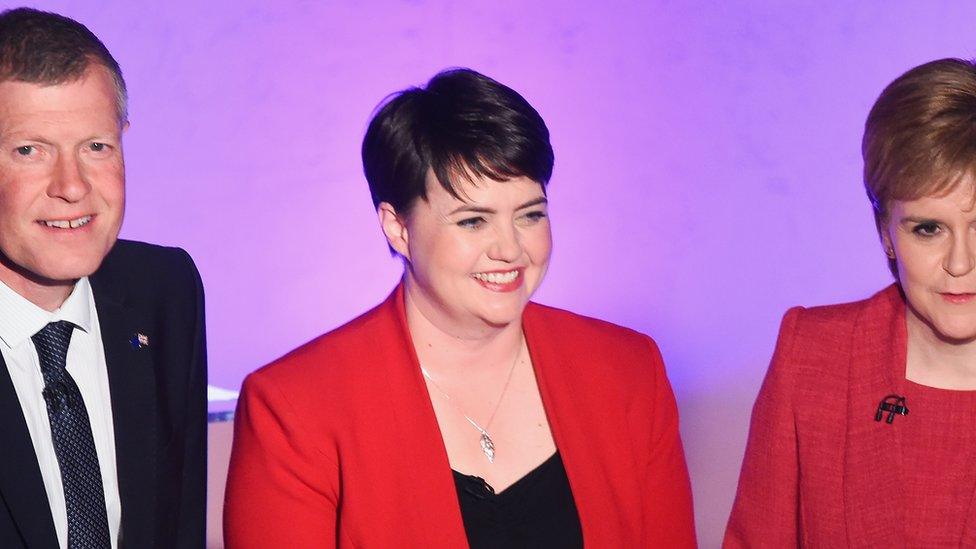
Ruth Davidson will be delighted with the row
Ruth Davidson will be utterly delighted with this outcome. You could almost hear the crunch of the popcorn at Scottish Conservative HQ as the debate unfolded.
In the immediacy, the standout moment of the debate up until that point had been the three other leaders rounding on Ms Davidson about the child tax credit cap and the "rape clause".
Given their UK-wide competition is with Labour, the Conservatives will be doubly delighted that the morning headlines are all about Labour and independence, rather than that.
The Conservative campaign after all is centred squarely on opposition to indyref2. This latest row is a chance for them to shore up the unionist vote in their favour. They might even hope to gain a seat or two - a big Labour vote in Tory target seats could have split the unionist vote and left the SNP coasting to victory.
Talking of Ruth Davidson, interestingly she posted on Twitter that she had also spoken to Ms Sturgeon the day after the Brexit vote - and had taken the precaution of recording the conversation.
That tweet was hastily deleted, although it should be noted that simply recording a conversation for personal use doesn't break any laws.
She now says the first minister is a "clype", which is a rather more measured response - and an opportunity for the Tories to attack both sides.

5. What does it mean for the campaign?
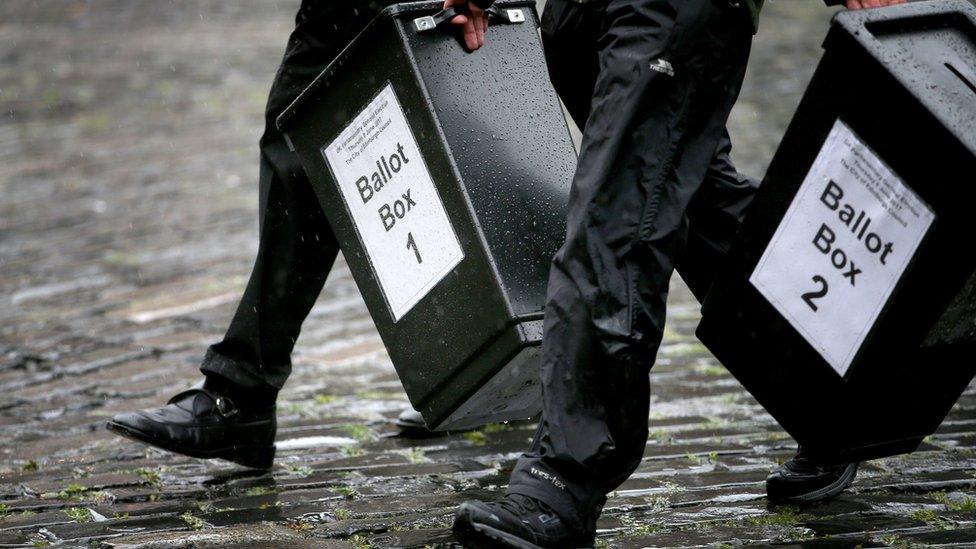
There isn't much time left for parties to react to the row
Ms Sturgeon's immediate intention was surely to damage Labour. It's possible the SNP's army of doorstep-chapping volunteers had been reporting back concerns that the red vote was on the rise.
Revealing details of a private conversation might have some blowback for the first minister, but the SNP note that Ms Dugdale herself had spoken about the chat previously.
Damaging Scottish Labour's credibility might help shore up SNP votes in the likes of Glasgow - although those were considered fairly safe in any case.
For Labour, the blow is aimed at what their other main opponents, the Conservatives, have long considered the weak point in their armour: opposition to indyref2.
Ms Dugdale had spent much of the campaign reinforcing her message of outright opposition, which has taken an unexpected last-minute battering. Activists will be scrambling back out on the doorstep in the likes of Edinburgh South to start re-reinforcing the message.
For the Conservatives, it's a chance to put the debate squarely back in binary terms - Yes vs No; SNP vs Tory. A two-horse race, without Labour complicating matters.
And in truth, that's territory that suits the SNP every bit as much as the Conservatives.
- Published6 June 2017
